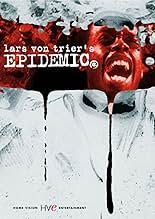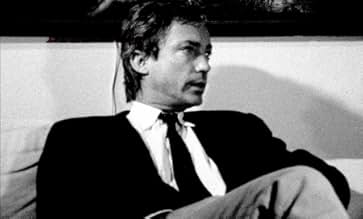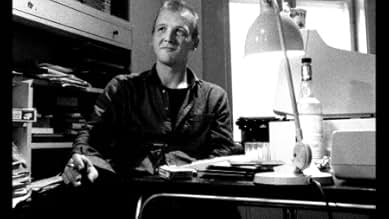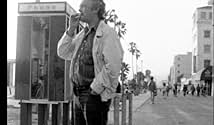IMDb रेटिंग
5.9/10
6.5 हज़ार
आपकी रेटिंग
एक निर्देशक और पटकथा लेखक एक स्क्रिप्ट को कलमबद्ध करते हैं और इस प्रक्रिया में, कल्पना और वास्तविकता के बीच की रेखा को धुंधला करते हैं.एक निर्देशक और पटकथा लेखक एक स्क्रिप्ट को कलमबद्ध करते हैं और इस प्रक्रिया में, कल्पना और वास्तविकता के बीच की रेखा को धुंधला करते हैं.एक निर्देशक और पटकथा लेखक एक स्क्रिप्ट को कलमबद्ध करते हैं और इस प्रक्रिया में, कल्पना और वास्तविकता के बीच की रेखा को धुंधला करते हैं.
- पुरस्कार
- कुल 1 नामांकन
फ़ीचर्ड समीक्षाएं
10ooeht
Of course, you gotta be a masochist to enjoy some people's genius - you know that if you bear with them they will take you to new levels of perception.
With Lars von Trier, the voyage is often hilarious. Epidemic is funny. Funny, in a Gummo kind of way: the characters are real, reality is eerie, and we laugh to break the tension; funny in a the characters say amusing things kind of way (preacher: "this bible is in goddamned Latin"); and funny in an Andy Kaufman screwing with the audience (yes, you) kind of way.
Make no mistake: you will suffer. If you are afraid, stay away from horror movies, ya pansy!
This movie also features some great aesthetic distance! It's bold!
With Lars von Trier, the voyage is often hilarious. Epidemic is funny. Funny, in a Gummo kind of way: the characters are real, reality is eerie, and we laugh to break the tension; funny in a the characters say amusing things kind of way (preacher: "this bible is in goddamned Latin"); and funny in an Andy Kaufman screwing with the audience (yes, you) kind of way.
Make no mistake: you will suffer. If you are afraid, stay away from horror movies, ya pansy!
This movie also features some great aesthetic distance! It's bold!
I like Von Trier's films and this one and "The Idiots" seem to me the ones in which he achieves through both the way they are shot and the plot in itself, a high quality of personal artistic expression.
Concentrating on "Epidemic", I think the contrast between the black and white parts and the "story" is intriguing and effective, visually disturbing and helping to create the symbolic meaning the viewer could take from this movie.
To me, beyond more evident interpretations about predestination, Dreyer-like bad and evil explanations, I believe Von Trier -with the help of, for instance, bleak houses, rundown sourroundings and disease- tries to tell us that the world we're living is infected by a growing disease, living its marks in EACH ONE OF US, making Europe in general a dull and heartless place to live, a world killing us very slowly and with it our soul, our sensibility and our ability to feel. Like the final song : "we all fall down".
Against the complacency and cynism of much of the cultural expression nowadays, I think Von Trier's work is an exemple. That is why I recommend "Epidemic" to IMDB users.
Concentrating on "Epidemic", I think the contrast between the black and white parts and the "story" is intriguing and effective, visually disturbing and helping to create the symbolic meaning the viewer could take from this movie.
To me, beyond more evident interpretations about predestination, Dreyer-like bad and evil explanations, I believe Von Trier -with the help of, for instance, bleak houses, rundown sourroundings and disease- tries to tell us that the world we're living is infected by a growing disease, living its marks in EACH ONE OF US, making Europe in general a dull and heartless place to live, a world killing us very slowly and with it our soul, our sensibility and our ability to feel. Like the final song : "we all fall down".
Against the complacency and cynism of much of the cultural expression nowadays, I think Von Trier's work is an exemple. That is why I recommend "Epidemic" to IMDB users.
Look, I know a substantial proportion of the American population get a little hot under the collar when funny-talking foreigners start criticising the American government and way of life, but hey - when you're the only country in the world inclined to and capable of dictation of world policy, you gotta take it on the chin. While Von Trier even makes me wince sometimes (the end credits to Dogville for instance), it's his point of view and is worthy of thought. He isn't here to lick your derrière clean for you - if you can't take a little criticism of the homeland, I'd steer clear of any imported movies for a while. Anyhoo, when truly disrespectful films like Titanic break records and reap awards with nary a raised eyebrow, it's double standards to expect non-US films to walk the line you'd like. Von Trier is a genius film-maker... you may not agree with his politics, but you cannot doubt his talent.
EPIDEMIC (Lars von Trier - Demark 1987).
Von Trier's second feature reveals his obsessions with cinema, with his self-imposed limitations on film-making in many ways foreshadowing Von Trier's later obstructions upon Jorgen Leth in THE FIVE OBSTRUCTIONS (2003).
Essentially a film about his own obsessions, or a grand parody on horror, as some suggested. Von, Trier, frustrated by the delay of his never realized project, "The Grand Mal", about two gangster families in divided Berlin, made a bet with film consultant Claes Kastholm of the Danish Film Institute, claiming that he could make a feature film for one million Danish kroner. Resulting partly in an amateur movie about a film director and a scriptwriter who must write a new manuscript in five days, interspersed with scenes from the film they are working on - about a young idealistic doctor in the late 20th century, who tries to fight an epidemic, but only manages to spread it further. The film culminates with the outbreak of a deadly plague, not in the past but in the present. Throughout the film, Von Trier shows his fascination with Germany, for example, during a ride through the "Ruhrgebiet", the industrial core of Europe, or the world, at least during the '80s.
Camera Obscura --- 8/10
Von Trier's second feature reveals his obsessions with cinema, with his self-imposed limitations on film-making in many ways foreshadowing Von Trier's later obstructions upon Jorgen Leth in THE FIVE OBSTRUCTIONS (2003).
Essentially a film about his own obsessions, or a grand parody on horror, as some suggested. Von, Trier, frustrated by the delay of his never realized project, "The Grand Mal", about two gangster families in divided Berlin, made a bet with film consultant Claes Kastholm of the Danish Film Institute, claiming that he could make a feature film for one million Danish kroner. Resulting partly in an amateur movie about a film director and a scriptwriter who must write a new manuscript in five days, interspersed with scenes from the film they are working on - about a young idealistic doctor in the late 20th century, who tries to fight an epidemic, but only manages to spread it further. The film culminates with the outbreak of a deadly plague, not in the past but in the present. Throughout the film, Von Trier shows his fascination with Germany, for example, during a ride through the "Ruhrgebiet", the industrial core of Europe, or the world, at least during the '80s.
Camera Obscura --- 8/10
Epidemic (1987), directed by Lars von Trier, is a meta-cinematic exploration of the blurred line between fiction and reality. The film follows a director and screenwriter who, while working on a script about a plague, find themselves caught up in a real-life epidemic, mirroring the events they are writing. This film is a challenging and unconventional piece of work, characteristic of von Trier's early style, marked by its fragmented narrative and philosophical underpinnings.
The performances are fittingly restrained, with Allan De Waal and Ole Ernst bringing a sense of detachment and intellectual depth to their characters, reflecting the film's thematic concerns. The film's low-budget aesthetic, with shaky handheld camerawork and raw sound design, serves to reinforce the sense of chaos and uncertainty that permeates the narrative. It's a deliberate stylistic choice that enhances the surreal, almost documentary-like atmosphere, but it may be off-putting to some viewers who prefer more polished filmmaking.
Von Trier's direction is methodical, and while the premise of the film offers intriguing possibilities, the execution can feel disjointed and unclear at times. The dialogue often veers into abstract territory, and the narrative structure is fragmented, leaving viewers to piece together the meaning behind the events. The film's slow pace, combined with its minimalistic style, can make it feel like a deliberately inaccessible work, challenging the audience's patience.
Epidemic is a film that operates on multiple levels, blending political, artistic, and existential commentary with a quasi-documentary style. While it offers some thought-provoking moments, it struggles to maintain coherence and impact over its runtime. It is best suited for those interested in avant-garde cinema or those looking to delve into the early works of Lars von Trier, but casual viewers may find it frustrating.
Rating: 6/10. A provocative, if uneven, exploration of the intersection between art, reality, and societal collapse.
The performances are fittingly restrained, with Allan De Waal and Ole Ernst bringing a sense of detachment and intellectual depth to their characters, reflecting the film's thematic concerns. The film's low-budget aesthetic, with shaky handheld camerawork and raw sound design, serves to reinforce the sense of chaos and uncertainty that permeates the narrative. It's a deliberate stylistic choice that enhances the surreal, almost documentary-like atmosphere, but it may be off-putting to some viewers who prefer more polished filmmaking.
Von Trier's direction is methodical, and while the premise of the film offers intriguing possibilities, the execution can feel disjointed and unclear at times. The dialogue often veers into abstract territory, and the narrative structure is fragmented, leaving viewers to piece together the meaning behind the events. The film's slow pace, combined with its minimalistic style, can make it feel like a deliberately inaccessible work, challenging the audience's patience.
Epidemic is a film that operates on multiple levels, blending political, artistic, and existential commentary with a quasi-documentary style. While it offers some thought-provoking moments, it struggles to maintain coherence and impact over its runtime. It is best suited for those interested in avant-garde cinema or those looking to delve into the early works of Lars von Trier, but casual viewers may find it frustrating.
Rating: 6/10. A provocative, if uneven, exploration of the intersection between art, reality, and societal collapse.
क्या आपको पता है
- क्रेज़ी क्रेडिटThe film's title appears in red letters in the upper left corner of the screen for the entire length of the film.
- कनेक्शनFeatured in The Making of 'Europa' (1991)
- साउंडट्रैकTannhäuser (The Overture)
Composed by Richard Wagner
टॉप पसंद
रेटिंग देने के लिए साइन-इन करें और वैयक्तिकृत सुझावों के लिए वॉचलिस्ट करें
- How long is Epidemic?Alexa द्वारा संचालित
विवरण
बॉक्स ऑफ़िस
- दुनिया भर में सकल
- $938
- चलने की अवधि
- 1 घं 46 मि(106 min)
- रंग
- ध्वनि मिश्रण
- पक्ष अनुपात
- 1.66 : 1
इस पेज में योगदान दें
किसी बदलाव का सुझाव दें या अनुपलब्ध कॉन्टेंट जोड़ें



















